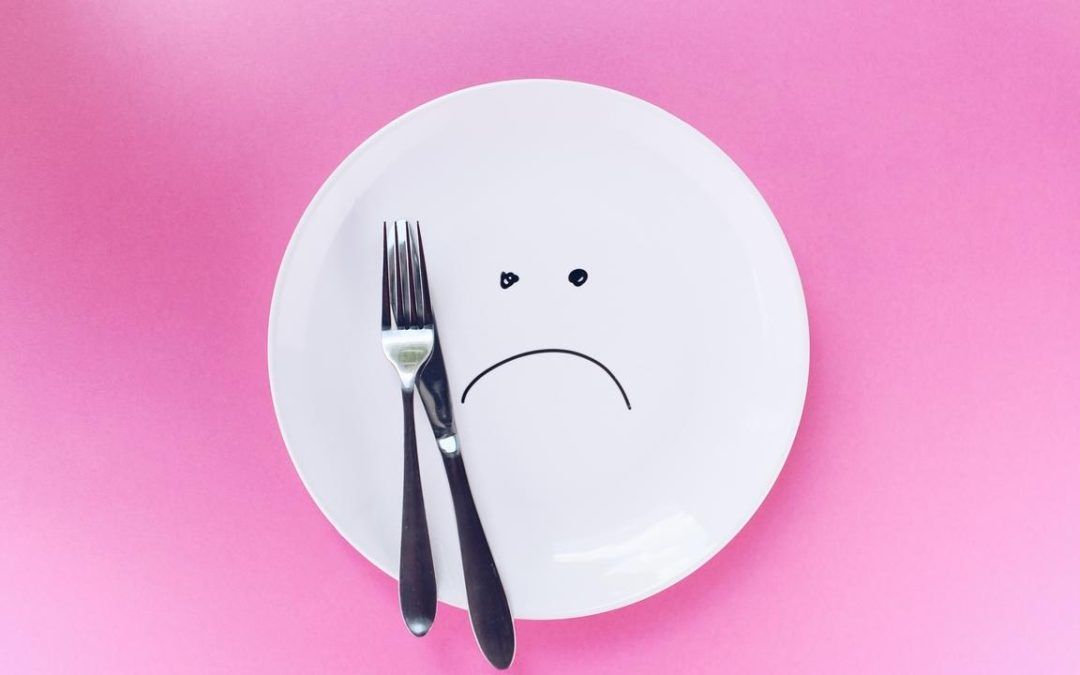Many times, poor nutrition, hormones, lack of sleep, thirst or chronic stress are masquerading as hunger. Learn to read the signals before reaching for something to eat.
1. Poor Nutrition: A person can overeat, yet still feel hungry all the time. If your food choices lack nutrients, your body will crave food to satisfy this deficiency. If you aren’t getting enough protein and fat, you may not feel satisfied. If you’re eating too many refined carbohydrates, your body will crave more. Refined carbs burn very quickly in your body. Until you retrain your body to also burn fat for fuel, you’ll crave more refined carbs.
Fix:
- Balance your macronutrients every time you eat. Everyone’s body has different needs, but typically well-balanced macros are moderate protein, good quality fat to reach satiety and good quality carbs. Get your carbs from vegetables and fruit versus refined flours, sugars, and processed food.
- Eat a wide variety of colorful, seasonal, local food. Buy as many different colored foods as possible when shopping. If you buy local, you will most likely be buying seasonal. Take the 5-Day Kitchen Challenge and download my Kitchen Purge and Restock guide here.

2. Hormones: Ghrelin is the hunger hormone that increases your appetite. Leptin is the hormone that is produced by your fat cells and signals satiety. These can get knocked out of whack by lack of sleep, carrying too much body weight, lack of exercise, and eating inflammatory food or food lacking in nutrition.
Fix:
- Develop a nighttime ritual to improve and increase sleep. Minimize artificial light after dark. Get morning sun exposure when you wake up.
- Increase daily movement, dance, walk, yoga or whatever is fun for you. If it’s fun, you’ll do it more regularly.
- Balance macros, avoid processed foods and eat nutrient-dense food.
3. Low-Blood Sugar: Hypoglycemia can cause stronger hunger signals and can also be very dangerous.
Fix:
- Work with your medical practitioner to get this under control.
- Reduce carbs and balance macros.
- Make sure you are getting magnesium and minerals in your diet.
4. Thirst: It’s imperative to stay hydrated. Humans are made up of 70% water and cannot live more than 3 days without it. Thirst can be easily mistaken for hunger. The sense of thirst signal is regulated in the hypothalamus located at the base of your brain. This message weakens as we age. Learning to take steps to manage your water intake is a must.
Fix:
- Drink a big glass of water or sole water first thing in the morning to reset your body and send the message that all is OK. Make sure your water is clean and filtered. Most tap water has added chemicals. Avoid plastic bottles of water.
- Know your intake goal and spread throughout the day. Set a timer if that helps you stay on track. Current recommendations are .5-1 ounce per pound of body weight. This will also vary based on your activity level.
- Make sure you are getting plenty of electrolytes as well. They are mineral substances that conduct an electrical current, with the main ones being sodium, potassium, and chloride. Bananas, coconut water, and watermelon are good sources. If you choose a sports drink, be careful to read the labels, most are full of chemicals and sugars. Homemade is best and is easy. Mix ½ tsp sole water (or a pinch of Himalayan sea salt), 1 tsp honey (optional) and juice from 1 lemon, lime or orange into 2 cups of water. Mix, chill, and drink. I’ll make a batch on big hike or sports days.

5. Food Addictions: You need to eat food to fuel your body. When eating becomes compulsive or uncontrollable, it’s a sign of addiction. Refined sugar and processed foods are highly addictive.
Fix:
- The best first step is to do a sugar detox. Not easy and not fun, but you’ll come out of it with more energy, less inflammation and more control over your cravings. You may experience legitimate withdrawal symptoms.
- Avoid trigger events such as social gatherings, celebrations or sporting events. Once your cravings are under control, replace your response to these events with something else. You won’t want to avoid these events forever if you want any kind of social life.
6. Stress: Stress is a healthy, lifesaving response. When it becomes chronic, it is no longer healthy, and you’ll have problems in other areas of your life besides just managing your hunger signals. Stress is the source of many health conditions.
Fix:
- Exercise can help move out that negative energy. However, replacing chronic stress with chronic exercise won’t do you any favors.
- Get your sleep habits under control.
- Practice mindfulness with meditation, breathwork, yoga or walks.
- Optimize your magnesium levels.
6. Boredom: It’s so easy to scarf a large bucket of popcorn at a movie, or grab a handful of nuts, chips or candy every time you walk by the kitchen.
Fix:
- Practice intentional mindful eating.
- Stay hydrated.
- Go for a walk or do something to distract yourself.
- Eliminate unhealthy food and snacks from your kitchen.
7. Alcohol: Not only can it be high in calories, but it also stimulates hunger and leads to poor decision making.
Fix:
- Consume without high sugar mixers.
- Consume moderately or avoid altogether.
Intermittent fasting can help reset your hunger signals I just finished my first 48-hour bone broth fast and can report that it wasn’t nearly as challenging as I expected. I have done a few 24-hour fasts and do 16-hour fasts on most days. My impetus to pursue this challenge was curiosity. Could I do it? My family was out of town for a few days, so it was the perfect opportunity to test it out.
I kept myself busy. I drank lots of water and sole water and drank bone broth at mealtimes. I only did very easy yoga and walks for exercise. On day 1 when I felt hungry, I’d have a big glass of water and do something different than what I was doing. It worked and I was never uncomfortable. On day 2, I never really felt hungry and was shocked at how high my energy level was. And I got so much done! Without cooking, feeding kids and cleaning up, I had so much more time on my hands.
The biggest lesson I learned was to really understand the hunger signals my body was sending me. I work at home and often find myself grabbing a handful of nuts or a protein bar from the kitchen, more from habit than true hunger. This challenge has taught me to take pause and listen.
Eat mindfully and practice analyzing your hunger signals. When you do eat, slow down and enjoy every bite, preferably with others. Questions, comments, and shares are welcomed.
In Health,
Coach Nanette



